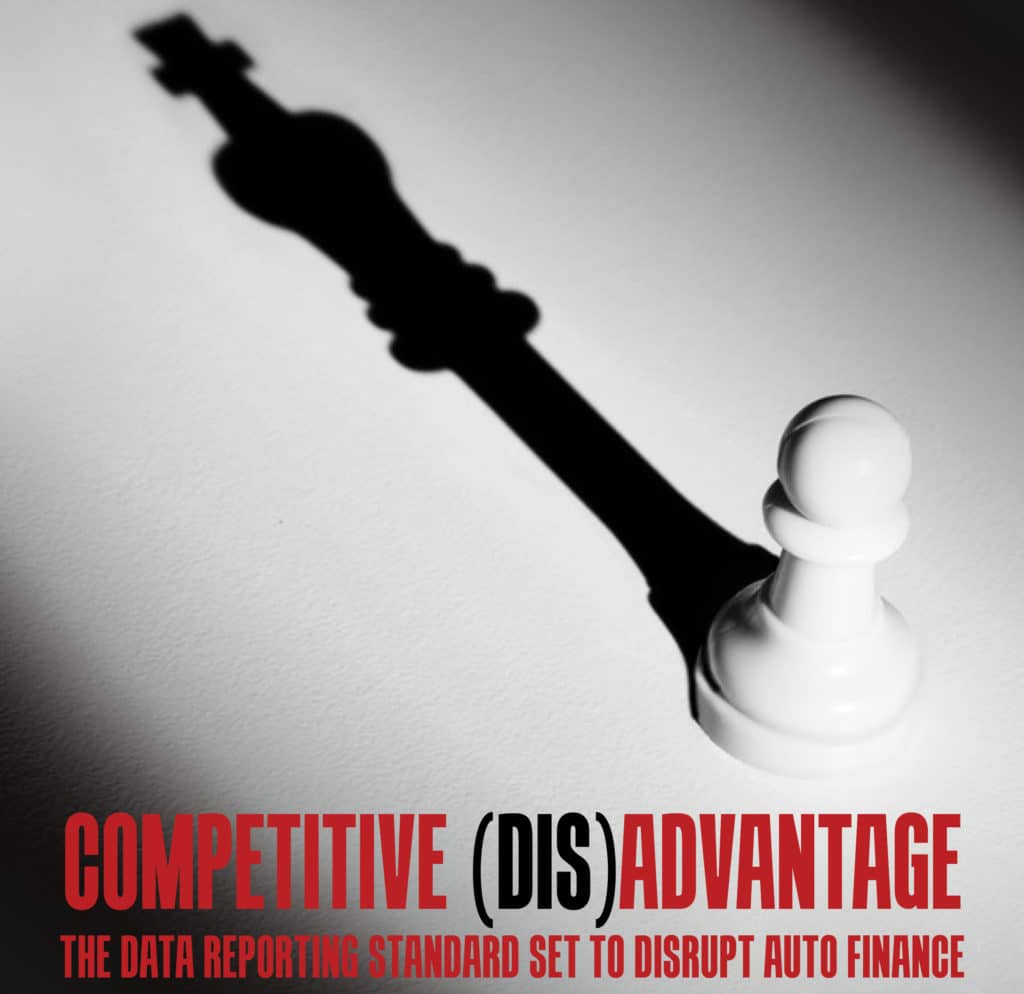Competitive (Dis)Advantage: The Data Reporting Standard Set to Disrupt Auto Finance

A new accounting regulation with a staggered implementation schedule is on track to disrupt the auto finance playing field.
The Financial Accounting Standards Board (FASB) rule called Current Expected Credit Losses — or CECL, for short — requires lenders to reserve for the lifetime of a loan’s losses upon origination, which could double loss provisions for some auto financiers. Yet only Securities and Exchange Commission filers must adopt the new standard on Jan. 1, 2020. Smaller banks and credit unions have until 2021 or 2022 to implement the rule.
The two years of transition to CECL may create an imbalance in the auto finance market, shifting the competitive advantage to smaller lenders, Cristian deRitis, deputy economist at Moody’s Analytics, told Auto Finance News. “While institutions are not permitted to build up their allowances in anticipation of the transition to CECL, they could pull back on lending in order to preserve capital and lower the impact of the transition,” he said.
Alternatively, larger lenders might increase pricing as they seek to offset steeper anticipated loss reserves. Also, as larger banks try to optimize CECL estimates, they may shift to shorter term loans and higher quality credit — steps that will help “lower that total lifetime loss number” and create opportunity for smaller players, deRitis said.
Meanwhile, CECL’s mandate to estimate lifetime loan losses saddles lenders — large and small — with stiffer data requirements and methodology changes.
How do lenders adjust operations now that they must book expected lifetime losses on the first day a loan is originated? This question is top of mind for the industry, since higher loss allowances impact capital levels, product offerings, and business strategy.
Getting the Ball Rolling
Current accounting standards require lenders to record losses based on an increased likelihood that a loan will become impaired. Investments are recognized as “impaired” when there is no longer an assumption that a loan’s balance will be collected in full under the originally contracted terms. With CECL coming into play, big banks have been quick to react.
For JPMorgan Chase & Co., if credit remains “relatively benign,” the bank expects to increase reserves by about $5 billion because of CECL, a company spokesman told AFN. “We expect the largest driver will be credit cards, with less material impact on other lending businesses, including auto,” he said.
Upon implementation, the credit loss adjustment will range from $4 billion to $6 billion, but an adverse-case scenario would bump up estimates to the $6 -billion-to-$10-billion range. The bank noted that the CECL adjustment will be included in its 2020 stress testing and capital planning submission to the Federal Reserve.
Bank of America said its loss-reserve increase would be as high as saving an additional $2 billion, Chief Financial Officer Paul Donofrio said during the bank’s first-quarter earnings call.
“[Bank of America] made a lot of progress, and our efforts are continuing,” Donofrio said on the call. “We did a parallel run in the first quarter, which we’re still analyzing, but based upon the early estimates we do expect CECL reserves to increase. I think it’s important to point out there’s still a lot more work to do.”
Donofrio noted that any adjustment to reserves would be based on “the composition of our portfolio and the forecast of economic conditions at that time, which is going to be yearend.”
Though Citizens Financial Group Inc. has yet to disclose its estimated allowance adjustment under CECL, the bank has said that the accounting standard “is likely to have a negative impact, potentially materially, to the allowance and capital at adoption in 2020,” according to its 2018 annual filing. “However, Citizens is still evaluating the impact,” the bank wrote in in the filing. Citizens has had a “company-wide, cross-discipline governance structure” dedicated to implementation in place for the past 18 months, and it expects to begin parallel testing for the standard in the second half of 2019, according to the 10-K.
BB&T Corp., meanwhile, sent a comment letter to FASB voicing concerns about the new accounting standard, especially now that the bank is merging with SunTrust Banks.
“When we adopt CECL in 2020, the purchased credit impaired loans and some of the other loans will be reclassified into ‘purchase credit deteriorated,’” BB&T’s Senior Executive Vice President and Chief Financial Officer Daryl Bible said during the company’s first-quarter earnings call. “And then, we will allocate a life of loss — the CECL reserve — to the remaining SunTrust and BB&T loans at that point in time.”
BB&T also noted that life-of-loan reserve adjustments during the early stages of a recession deplete capital more severely than the current incurred-loss accounting approach. Each incremental loan originated requires an upfront charge to earnings and is immediately dilutive to capital, whereas loan runoff is accretive.
“It’s a kind of a really odd accounting,” Bible said on the earnings call. BB&T did not disclose the dollar amount increase to its reserves.
Preparing for CECL Implementation
While the timeline for establishing a new CECL program will vary depending on an institution’s data and economic model choice, Moody’s Analytics’ Director and Senior Economist Sohini Chowdhury said it will generally take 18 months to implement — and that doesn’t account for the data collection portion of the process.
On top of that, a lender’s increase in loss allowance could reach more than two times the amount required by the incurred-loss accounting method, Chowdhury said at the Auto Finance Risk Summit in May.
Because CECL is a principles-based approach, lenders will have the freedom to choose an economic model and one of six loss-reserve methodologies upon which to base estimates. Institution size, portfolio mix, and data availability will influence those choices, however, flexibility is banks’ biggest concern at this point, Chowdhury said.
“Nobody wants to be an outlier, because you have to justify all the more if out of the six methods everyone is picking No. 1, 2, or 3, and you are the only one doing No. 5,” she said, adding that those lenders should expect to be questioned by FASB. The agency will be strict, Chowdhury said, not in what is right or wrong, but in making sure the lender can provide “reasonable justification” for its choices.
So far, probability of default (PD) and loss-given default (LGD) methods have been most popular, Chowdhury said. Though, that’s also because the size of the banks that are testing CECL are big banks or SEC filers, so other methodologies have been experimented with less frequently.
Data collection is the first — and most demanding — step in establishing a CECL program. “Public banks that have started the process are realizing this is one of the biggest challenges they have,” Chowdhury said.
CECL requires banks to have additional disclosures to support their accounting estimates. Data must be collected by vintages, and Chowdhury advised lenders to start collecting data now to ensure they have “at least a couple years’ worth of good data.”
Determining what methodology is available and whether the approach is granular or broad all boils down to the amount of data. “The single most important element here is the economic scenario,” Moody’s DeRitis said. “It could impact the level of losses, the volatility of losses, as well as the cyclicality.”
Because there is no right or wrong answer with CECL, banks can choose to have an optimistic view of the future. “That will be nice for some time, but it certainly will expose you to some volatility in that loss estimate as those losses are realized,” he said.
DeRitis and Chowdhury urged lenders to implement a balanced approach that considers multiple economic and loss scenarios to manage risk.
Forging Ahead
While lenders are making headway on their CECL preparations, an April report by compliance solution provider Abrigo suggests that the progress is “not enough.”
Respondents to the survey — entitled CECL: Where Are We Now? — were C-suite executives and analysts from financial institutions nationwide with varying portfolio sizes.
“The clock is ticking,” Abrigo’s Senior Director of Advisory Services Regan Camp said in the report. “While many financial institutions are taking the necessary steps to make sure they are prepared for this important change in accounting for credit losses, it’s clear that others are falling behind their peers.”
The report noted that about half of SEC filers are not yet testing potential CECL-compliant methodologies. “The glaring concern in these SEC-filers’ responses is the seemingly limited number of institutions that have actually produced meaningful results,” Camp said. The survey reported that 3% of respondents have yet to begin CECL preparations.
Chowdhury called CECL “the biggest change in accounting rules in this century,” primarily because of its scope. “It touches every lender — either public or non-public will now have to switch,” she said.
Update: On June 11, a House bill was introduced with the proposal to delay the implementation of CECL, possibly into 2022. Ted Budd (R-N.C.) led the charge on the bill, calling on Congress in a press release to “make FASB complete this common-sense task” of considering “how this new accounting standard will impact lending in economic recessions and affect access to capital for the consumer in financial downturns.” A similar proposal arrived in the Senate on May 22.














